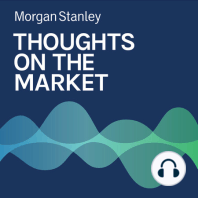4 min listen

Andrew Sheets: Falling Expectations for Global Equities
Andrew Sheets: Falling Expectations for Global Equities
ratings:
Length:
3 minutes
Released:
Feb 17, 2023
Format:
Podcast episode
Description
As our outlook for global equities becomes more cautious, what is influencing the move and what should investors watch as the story develops?----- Transcript -----Welcome to Thoughts on the Market. I'm Andrew Sheets, Chief Cross-Asset Strategist for Morgan Stanley. Along with my colleagues, bringing you a variety of perspectives, I'll be talking about trends across the global investment landscape and how we put those ideas together. It's Friday, February 17th at 2 p.m. in London. We recently moved to an underweight stance in global equities as part of our cross-asset allocations. I want to talk a bit about why we did this, why we did it recently and what we're watching. The 'why' behind this move is straightforward, global equities now have low risk-adjusted returns in our framework. Our expected return for global stocks is now below what we see for bonds in the U.S., Europe or emerging markets, and it's also lower than what we expect for U.S. dollar cash. With lower expected returns and higher expected volatility, we think it makes sense to hold a lower than normal amount of global equities, hence our underweight stance. In terms of why we've made this change recently, a few things have shifted. Per Morgan Stanley's forecast, we entered the year expecting low returns for U.S. equities, but higher returns for non-U.S. stocks. But as prices have gone up in 2023, our expected returns outside the U.S. have also fallen, while in the U.S. they're now negative. We also think about expected returns based on longer-run valuations, and then adjusting these for economic conditions. We frame those economic expectations through something we call our cycle indicator, which is trying to look at economic data through the lens of being either stronger or weaker than average, and improving or softening. That indicator recently flipped, indicating a regime where the data is still strong but it's no longer improving, and historically that's often meant lower than average equity returns. And all of this has happened at a time when yields have risen, which is improving expected returns for a lot of other assets. The U.S. aggregate bond index now yields about 4.7%, while 12 month U.S. Treasury bills yield about the same amount. That is raising the bar for what global equities need to return to be relatively more attractive within one's portfolio. For a change like this, what are the risks? Well, one would be a stronger economy, which tends to be better for stocks relative to other assets. And some recent data has been strong, especially related to the U.S. labor market and retail sales. Our economists, however, think the growth story is still murky. Recent economic data is being impacted by large seasonal adjustments, which may be accurate, but which could also be flattering January data if economic patterns have changed versus their pre-COVID trends. Meanwhile, other economic indicators from PMIs to the yield curve to commodity prices suggest a softer growth backdrop ahead. Falling expected returns for stocks relative to other assets have led us to downgrade global equities to underweight. A surprising rebound in global growth is a risk to this change, but for now, we see better risk adjusted reward elsewhere in one's portfolio. Thanks for listening. Subscribe to Thoughts on the Market on Apple Podcasts, or wherever you listen, and leave us a review. We'd love to hear from you.
Released:
Feb 17, 2023
Format:
Podcast episode
Titles in the series (100)
Michael Zezas: Indirect Impacts by Thoughts on the Market